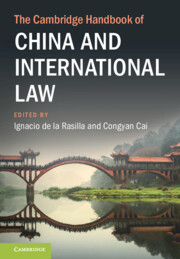Book contents
- The Cambridge Handbook of China and International Law
- The Cambridge Handbook of China and International Law
- Copyright page
- Contents
- Figures
- Contributors
- Foreword
- Acknowledgements
- Abbreviations
- Introduction
- Part I Taking Centre Stage in Global Governance and the International Legal Order
- Part II Interfaces between National and International Law
- Part III Selected Areas of Chinese State Practice
- Part IV International Peace and Security
- Part V Human-Centred International Law
- 13 China and International Human Rights Law
- 14 China and Global Health Law in the Face of Covid-19
- 15 China and International Humanitarian Law
- Part VI The Habitat and the Global Commons
- Part VII International Economic Law
- Part VIII International Dispute Settlement
- Index
13 - China and International Human Rights Law
from Part V - Human-Centred International Law
Published online by Cambridge University Press: 04 January 2024
- The Cambridge Handbook of China and International Law
- The Cambridge Handbook of China and International Law
- Copyright page
- Contents
- Figures
- Contributors
- Foreword
- Acknowledgements
- Abbreviations
- Introduction
- Part I Taking Centre Stage in Global Governance and the International Legal Order
- Part II Interfaces between National and International Law
- Part III Selected Areas of Chinese State Practice
- Part IV International Peace and Security
- Part V Human-Centred International Law
- 13 China and International Human Rights Law
- 14 China and Global Health Law in the Face of Covid-19
- 15 China and International Humanitarian Law
- Part VI The Habitat and the Global Commons
- Part VII International Economic Law
- Part VIII International Dispute Settlement
- Index
Summary
In the past decade, the international community has generally felt China’s proactive role in the international human rights discourse. China has made substantive contributions in the creation of international human rights law and continues to promote a global moral consensus view of human rights. Additionally, China regularly and positively interacts with international human rights mechanisms such as the Universal Periodic Review (UPR) and special procedures and treaty bodies. It practises the principles of respect, dialogue and cooperation rather than confrontation, while resisting politicization, selectivity and double standards. Since China emphasizes economic, social and cultural rights, there is an impression that it ignores civil and political rights or selectively safeguards human rights. This conclusion is difficult to support when we review the recent movements within Chinese policy and judicature when it comes to human rights. Considering its positive commitment to civil and political rights during the third UPR and in its fourth National Human Rights Action Plan, China is expected to make substantive progress in the comprehensive, balanced protection of all human rights.
Keywords
- Type
- Chapter
- Information
- The Cambridge Handbook of China and International Law , pp. 261 - 283Publisher: Cambridge University PressPrint publication year: 2024

